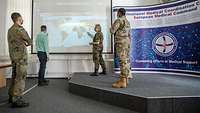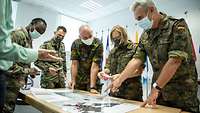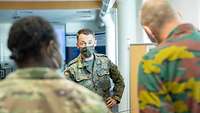Planning Week for Pandemic Simulation Exercise Resilient Response 2020
Planning Week for Pandemic Simulation Exercise Resilient Response 2020
- Date:
- Reading time:
- 3 MIN
Fourteen participants from nine countries and multinational organisations met at the Multinational Medical Coordination Centre / European Medical Command (MMCCMultinational Medical Coordination Centre/EMCEuropean Medical Command) from 8 to 10 September to set the parameters for the pandemic simulation exercise Resilient Response 2020.
The exercise scheduled for November is a joint initiative of MMCCMultinational Medical Coordination Centre/EMCEuropean Medical Command, the Federal Office of Civil Protection and Disaster Assistance, and the European Centre of Excellence for Countering Hybrid Threats (Hybrid COECentre of Excellence). In the course of the exercise, persons bearing responsibility in different armed forces and government agencies will simulate and optimise their responses and cooperation in an epidemic. "I am proud that RESILIENT RESPONSE 2020 gives us the opportunity to implement the methods of wargaming in a comprehensive medical context like the current COVID-19Coronavirus Disease 2019 pandemic", said Lieutenant Colonel, Pharmacy Corps, Ronnie Michels, Head of the Wargaming and Exercises Branch at MMCCMultinational Medical Coordination Centre/EMCEuropean Medical Command, and responsible developer of the exercise.
Owing to current travel restrictions in Finland, the planning conference that was originally planned to take place at the Hybrid COECentre of Excellence in Helsinki was relocated to MMCCMultinational Medical Coordination Centre/EMCEuropean Medical Command in Koblenz at short notice. Many of the international participants attended the event per video. First, the parameters of the planned threat were defined in numerous group sessions. The focus was on the elaboration of the underlying rules of the game. To make the simulation as realistic as possible for all participants, the planning group determined a round-based setup modelled on the phases of a real pandemic.
Decisions and consequences
In each phase, the participants have the opportunity to respond to the challenges they face with different measures like hygiene and quarantine regulations. In the further course of the game, each action has an effect on the coming rounds at three different levels: epidemiologic, economic, and social effects are considered. A value is set for each of these three parameters that gives a comparable overview of the situation and from which the teams start into the next phase. In each phase, each team always seeks to keep the value of its country as low as possible.
The underlying virus model was developed by Lieutenant Colonel (Medical Corps) Dr Maren Kosak, Head of the Medical Situational Awareness / Civil-military Interface Branch at MMCCMultinational Medical Coordination Centre/EMCEuropean Medical Command: "The characteristics of the virus causing the pandemic in exercise Resilient Response 2020, are similar to those of coronavirus". The calculation factors used have been derived from the risk assessment of the Robert Koch Institute.
The values for economic and social stability have been developed similarly carefully. Here, too, all decisions made by the participants on a variety of factors have a positive or negative impact on their score. Another important point of discussion among the game planners was the timing of the individual moves. Each move is to challenge the participants while at the same time leaving them enough time to assess their measures taken and to discuss with each other.
Concluding with a test run
The climax of the planning conference was the conduct of a demonstration simulation during which the results of the previous group sessions underwent a first test run. Here, the participants carried out all moves under the operational conditions planned. MMCCMultinational Medical Coordination Centre/EMCEuropean Medical Command received much positive feedback for its live stream of the conference: “A brilliantly organised event,” praised Darren Mann from Great Britain in place of the online participants.
Hence, regardless of the further course of the real corona pandemic, it is ensured that the exercise will be conducted as planned. “I am glad that - despite the currently quite restricting conditions - MMCCMultinational Medical Coordination Centre/EMCEuropean Medical Command was able to carry out this conference with a high-value output”, Lieutenant Colonel, Pharmacy Corps, Ronnie Michel summarises the recent planning days. The lessons learned during the week will be incorporated into the exercise in several virtual coordination events that will follow.






